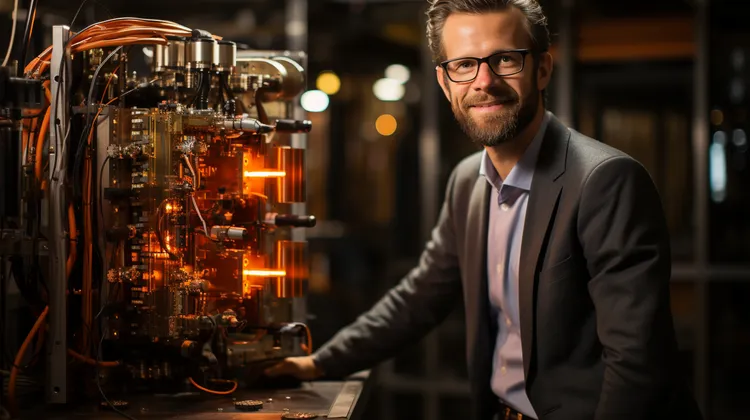
Revolutionizing Bitcoin Mining with Quantum Computers
Can quantum computers revolutionize Bitcoin mining? This is a question that has been circulating among technology enthusiasts and experts in recent years. While quantum computers have the potential to solve complex mathematical problems much more efficiently than classical computers, their impact on Bitcoin mining is still a widely debated topic.
Bitcoin mining is the process of adding new transactions to the blockchain and securing the network through solving complex mathematical puzzles. The current mining process relies heavily on computational power, and miners compete to solve these puzzles first to validate the transactions and be rewarded with newly minted Bitcoins.
Quantum computers, on the other hand, utilize quantum mechanics principles, such as superposition and entanglement, to perform calculations. These machines have the potential to process large amounts of information simultaneously, making them much faster than classical computers.
The main concern surrounding the impact of quantum computers on Bitcoin mining is their ability to break the encryption algorithms that secure the network. Bitcoin relies on cryptographic algorithms, such as SHA-256, to prevent unauthorized access and ensure transaction security. These algorithms are currently considered secure against classical computers, but quantum computers could potentially crack them.
If quantum computers become powerful enough to break the cryptographic algorithms, this could lead to serious consequences for Bitcoin and other cryptocurrencies. Miners would no longer be able to secure the network effectively, and malicious actors could alter transactions, double-spend coins, or even create new Bitcoins out of thin air.
It is crucial to note that the development of quantum computers capable of breaking the encryption algorithms is still in its early stages. Building a reliable and scalable quantum computer is an immense scientific and engineering challenge that is yet to be fully overcome. Even the most advanced quantum computers today are still far from reaching the computational power required to pose a significant threat to Bitcoin mining.
The Bitcoin community is well aware of the potential risks posed by quantum computers, and efforts are already underway to address this issue. One proposed solution is to upgrade Bitcoin’s cryptographic algorithms to ones that are resistant to quantum attacks. There are already alternative cryptographic algorithms, such as lattice-based cryptography or post-quantum cryptography, that show promise in resisting attacks from quantum computers.
In addition to algorithm upgrades, researchers are also exploring quantum-resistant blockchain architectures. These architectures aim to incorporate quantum-resistant algorithms and mechanisms into the core of the Bitcoin network. By doing so, they can ensure the security and integrity of the network, regardless of advances in quantum computing technology.
While it is essential to stay vigilant and prepare for the potential impact of quantum computers, it is also important to recognize that quantum computers can bring positive changes to Bitcoin mining. Quantum computers could help miners solve the complex mathematical problems required for mining more efficiently, reducing the energy consumption associated with the process. This would address one of the main criticisms of Bitcoin mining, its environmental impact.
Quantum computers could potentially improve the scalability of the Bitcoin network. The increased computational power offered by quantum computers could enable faster transaction processing and validation, leading to a more efficient and user-friendly Bitcoin platform.
The question of whether quantum computers can revolutionize Bitcoin mining is still up for debate. While the scientific and technological progress towards quantum computers is exciting, there are significant challenges to overcome before they pose a substantial threat to the security of the Bitcoin network. The Bitcoin community is actively researching and developing solutions to mitigate the potential risks and adapt to the changing landscape of computing. The successful integration of quantum computers into Bitcoin mining will require a careful balance between security and innovation.
11 thoughts on “Revolutionizing Bitcoin Mining with Quantum Computers”
Leave a Reply
You must be logged in to post a comment.
A careful balance between security and innovation is just a fancy way of saying we have no idea what we’re doing.
As if Bitcoin mining wasn’t already complicated enough, now we have to worry about quantum computers ruining it.
The only thing quantum computers will do is disrupt the already fragile balance of Bitcoin mining.
Quantum computers will just make Bitcoin even more exclusive and inaccessible to the average person. Great job!
Quantum computers bringing positive changes to Bitcoin mining? Yeah, right. 🙄
It’s laughable to think that upgrading algorithms will truly protect Bitcoin from quantum attacks. 😒
Quantum computers can’t solve everything, stop hyping them up. 😒
It’s great to hear that the Bitcoin community is already actively working on solutions to address the potential risks! Upgrading the cryptographic algorithms and exploring quantum-resistant blockchain architectures are crucial steps in ensuring the security and integrity of the network.
Quantum-resistant blockchain? Yeah, because that’s totally feasible. 😂
Overall, this article has given me a lot to think about, and I’m excited to see how the future unfolds for Bitcoin mining and quantum computers! 🌌 Let’s stay optimistic and continue the research to overcome the challenges that lie ahead. 💪💚
The concern about quantum computers breaking the encryption algorithms is valid, but the article highlighted that it’s still in the early stages. We still have time to prepare and upgrade the cryptographic algorithms to resist quantum attacks.